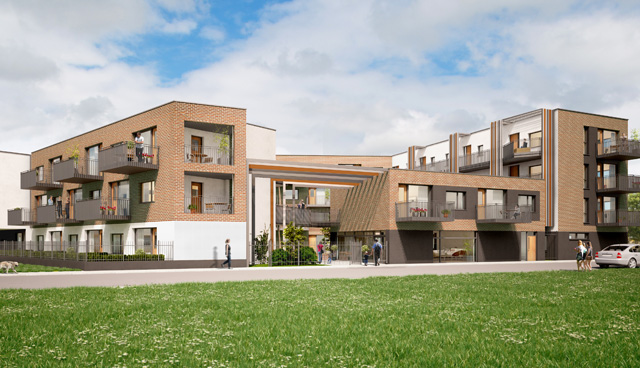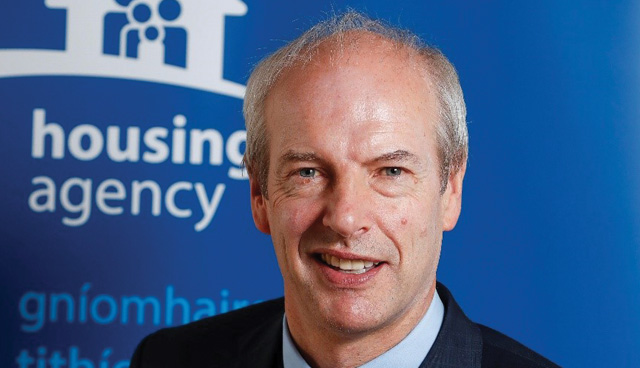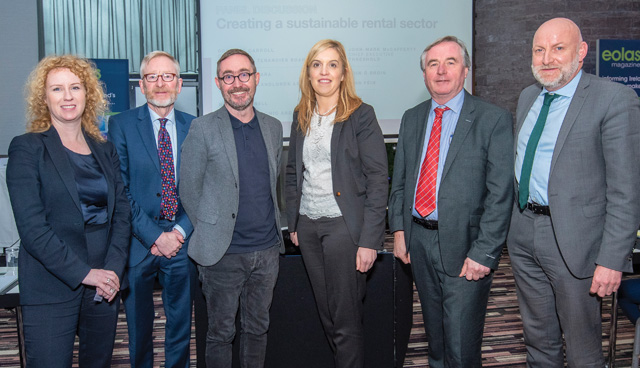
Equity funds, our new landlords
17th May 2019
Collaboration is still the key: Unlocking the future for housing
17th May 2019In opposition

Sinn Féin Housing spokesperson Eoin Ó Broin TD speaks to Richard Halleron about the several fundamental changes he would make, if given the opportunity to take on the role of housing minster.
Highlighting his desire to see the country’s capital spend increased from the current figure of €1.2 billion risen to €2.3 billion, Ó Broin believes that such a move would increase the number of housing units built per year by approximately 15,000, including social housing, affordable cost rental properties and affordable homes for people to buy outright.
“Enshrining the right to housing in the Irish Constitution would be my next priority, after which I would introduce a series of emergency measures, dealing with homelessness,” says Ó Broin. “Included within these measures would be the abolition of the current legislation which favours landlords wishing to sell their properties with vacant possession.”
Ó Broin adds: “Those renting houses would have long-term security of tenure. It would also be made mandatory that families and individuals could only be maintained in emergency accommodation for at least six months, after which they would be offered permanent accommodation opportunities.
“I would also introduce meaningful tax credits, as a means of ensuring that renting was made affordable for those living in the rental sector.”
Ó Broin has been to the fore in highlighting the amount of money paid by the Government to private landlords courtesy of rent subsidies, he outlines that in 2018, government spent a “staggering” €695.35 million in rent subsidies to private landlords and property owners. This “colossal” sum was paid to house 98,345 households across four schemes administered by two government departments.
“The Department of Social Protection spent €175.34 million on private landlords for 24,303 tenancies on the Rent Supplement Scheme,” he states. “The Department of Housing spent €100.4 million housing 11,684 households in long-term leased properties on the Social Housing Current Expenditure Programme. It spent a further €143.34 million to house 18,915 households in four year Rental Accommodation Scheme leases.
“The largest area of expenditure was through the Housing Assistance Payment Scheme which cost €276.6 million to house 43,443 households in short-term two-year leases. This is a massive transfer of public money to private landlords. It represents bad value for money for the taxpayer as well as the ‘casualisation’ of social housing into short-term insecure tenancies that are bad for tenants and for communities.”
Ó Broin’s views on social housing are fully reflected in his recently published book, entitled Home: Why Public Housing is the Answer. Within the book the TD sets out a radically different vision to what a functional housing system could look like by prioritising housing as a right and not a commodity.
“The problem with the provision of good quality, affordable housing in this State goes deeper than the current failing policy of Fine Gael and Rebuilding Ireland,” he says. “Since the 1980s, successive governments have pulled back from delivering public housing and left it to the market and the private rented sector to fill the gap.
“We are now living through the consequences of these policies. Social housing waiting lists are climbing, the private rented sector remains dysfunctional and there is a generation of working people who cannot afford to buy a home in the city that they work in.
“Home sets out a different vision. If the political will existed affordable, secure homes to rent and to buy could be delivered, the private rented sector could be reformed and housing inequalities would be tackled.”
The TD believes that Rebuilding Ireland, the €6 billion action plan launched by the Government in 2016 to tackle the country’s housing shortage is “failing those in greatest housing need”.
In the context of confirmation from the Department that child and family homelessness figures are increasing, he says: “The March homeless figures show that adult, child and family homelessness are all up since February. There are now 10,305 people officially classified as homeless by the Department of Housing, including 3,821 children.
“Of course, the number is actually much higher. However, it is once again clear that Rebuilding Ireland, the Government’s housing plan, is failing those in the greatest need of housing.”
Ó Broin has welcomed the publication of the report by the Ombudsman for Children’s office on children’s experiences of living in family hubs. “The ‘No Place like Home’ report published today by the Ombudsman for Children’s Office is hugely moving and incredibly important. The report uniquely gives a voice to the children and teenagers living in the family hubs across the State.
“It highlights the challenges they face on the daily basis from a lack of privacy to the stigma associated with living in emergency accommodation. It is crucial that all those in authority read the report and act on its recommendations. Sinn Féin fully support the recommendations.”
Ó Broin’s party has pledged that if in government, they will deliver a housing blueprint for this island that makes boom and bust property cycles, housing waiting lists, homelessness and environmentally-unsound housing, things of the past.
Sinn Féin has targeted the building of 100,000 new social and affordable homes and says it wants to ensure that one fifth of the properties built on all new developments will be offered as affordable and social housing.
The party also says that it will commit to introduce legislation to the interest rates that banks can charge and act to abolish the local property tax, while providing rent certainty courtesy of a tenant’s rights charter. This would take place alongside the introduction of rent regulation and a commitment to assess the feasibility of capping of rent subsidies.
Ó Broin recently published a Sinn Féin policy briefing paper, which looks at reforms that are required within Ireland’s private rental sector. Its main conclusion stresses the need for policies that seek to balance the interests of tenants, landlords and investors, both public and private.
This approach will ensure a properly regulated and functioning rental sector that provides high quality, stable and secure accommodation at prices people can afford.
Discussing a series of amendments to the Government’s Residential Tenancies’ Bill, drafted by Sinn Féin, the TD concludes: “Some of the key changes we are seeking is the removal of the sale of the property as a reason for landlords to evict tenants. We are also seeking to remove the clause that allows a landlord to evict tenants if a family member wishes to use the property.
“While critical of the failure of Rent Pressure Zones to protect tenants from rising rents we will be seeking to remove the rent pressure zone exemption for new properties on the market or properties that have not been let in last the two years.”








